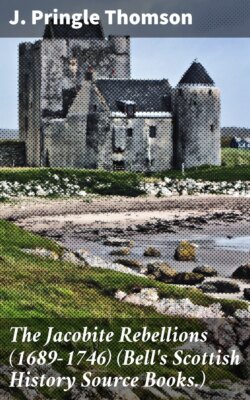Читать книгу The Jacobite Rebellions (1689-1746) (Bell's Scottish History Source Books.) - J. Pringle Thomson - Страница 26
На сайте Литреса книга снята с продажи.
A. The Last Scottish Parliament (1705).
ОглавлениеTable of Contents
Source.—A Journey to Edenborough in Scotland, p. 112, by Joseph Taylor, late of the Inner Temple, Esquire. Edited from the original manuscript by William Cowan. (Edinburgh: 1903.)
It hapned whilst we were at Edenborough, that the Act for a treaty of Union, between England and Scotland, was upon debate, and having the honour to have severall Lords and Members of parliament often dine with us, they inform'd us of the Grand day when the Act was to be past or rejected, and by speciall favour of my Lord high Commissioner, we had leave to stand upon the throne by his right hand: The usuall way to admit strangers is to give them a battoon; which holding in their hands, shows that they are forreigners. The Lords and Comons sit together; As soon as we heard the names call'd over, We observ'd Dukes, Marquesses, and Earles sat on the Uppermost seats on the right hand, Viscounts and Barons on the uppermost Seats of the left, The Knights of the Shires under the Dukes, Marquesses, and Earles, and the Burgesses and Commoners under the Viscounts and Barons. The Lord Chancellor under the Commissioner's Throne, The Lord Treasurer on his right hand, and the Secretary of State on his left, and directly under him the Lord Justice Clerk, and at the head of a long Table, on which is plac't the Crown, Scepter, and Sword, the Earle Marshall; The Lord high Commissioner has his Commission always before him in a velvet purse on his cushion.
When they began to debate, we observ'd that the principall leading men of the High party, or those which oppos'd the Court, were the Duke of H——,[14] the Duke of A——,[15] the Lord C——y,[16] and the Lord B—a—en,[17] and one Fletcher of Salton, who speaks well, but with a great deal of passion, The Earle of S—f—d,[18] who is Lord C——r,[19] is a very ingenious man, His cheif perfection, and what is most requisite for his office in the house, is resuming debates, which he does with an admirable dexterity, by giving soe happy a turn for the Interest of the party he espouses, that he generally carryes the point, without the censure of either party. The Lord high Commissioner says nothing; The Duke of Ar——e[20] was thought, as we were told not only too young for so high a Station, but too warm to bear the Reflections of some of the leading Malcontents, but on the contrary he behav'd himself in this criticall juncture, with so sedate and even a Temper, that he justly gain'd an universall reputation, and brought the Sessions to a happy conclusion. The Lord Chancellor determines upon all debates who shall speak first, when anything is put to the vote, every member is call'd by his name, and answers singly, approven, or not approven. The grand debate this day, being about the Act for a treaty with England, many learned speeches were made on the occasion. Some were for passing no Act till England had given them satisfaction for the affront they pretended was put upon them, by the Act pass'd last Sessions in England, which not only declar'd them Aliens, but prohibited their goods, and thereby touch't them in the most sensible part. Fletcher said, that England could not make them Aliens, since they were naturall born subjects to the Queen; … After his debate, others were for making the English Aliens in Scotland, as a Retaliation for our making them soe in England: … But after many other debates, and hard reflections on the English, it was at last put to the Vote, whether there should be added a clause to the Act of treaty, which should prohibit any treaty with England, till England had rescinded the Clause of Aliens, or whether it should be in a seperate way. Seperate way was carry'd by two Voices, … The next great point was, whether the Queen or parliament should have nomination of Commissioners: … 'Twas carry'd the Queen should nominate by 4 Voices. Then a Gentleman propos'd to add a clause, to preserve the discipline and Worship of the Kirk of Scotland, as at present establish'd: One propos'd it should be the Religion and Discipline, but my Lord Chancellor told them, that was all the same thing, and H——[21] said, 'twas not worth a Vote, and his brother the Earl of R——[22] ask't whether they might not add the Lord's prayer and Creed, and indeed by what I could observe, they would add the whole Common Liturgy of the Church of England, for they seem'd to be quite tir'd of the Kirk discipline: Now the whole Act being finish'd, the Vote was put whether it should be carry'd approven, or no, and 'twas carry'd approven, by 34 voices. As soon as this was over, we left the house, and that night Collonell Ogilby,[23] the Lord Chancellor's brother, the Lord Hardress,[24] and severall Lords and parliament men, came to our lodgings, and embrac'd us with all the outward marks of love and kindness, and seem'd mightily pleas'd at what was done; and told us we should now be no more English and Scotch, but Brittons. And thus we merrily spent the night, in drinking to the Success of the treaty and happy union, and next day, Colonell Ogilby and some Scotch Lords enquir'd mightily for the 3 English Gentlemen, as they call'd us, having a mind to give us a chirrupping Cup,[25] but we went to Leith that day, being willing to avoid them.
